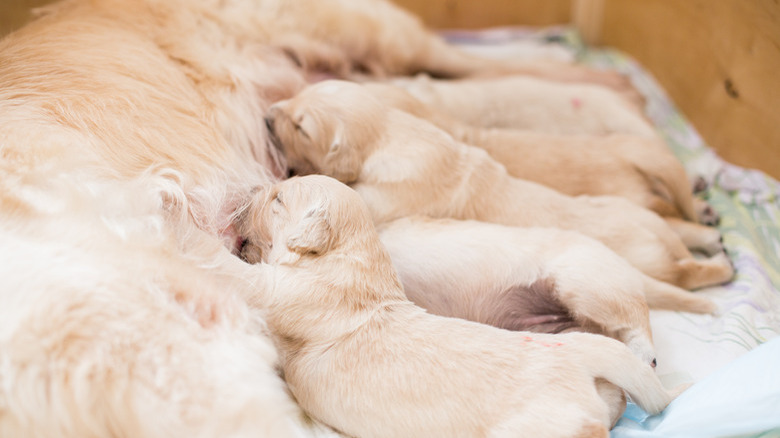Behaviors Of A Mother Dog After Birthing
Your dog has just given birth to a litter of puppies, and all you want to do is go in there and celebrate with her. But hold on. Your dog's priority now is to care for her puppies, and a mother dog's behavior after giving birth may change. Don't worry, though; once your dog has accomplished her puppy-raising mission, her behavior will change again and she'll start to act more like herself.
Dog nesting after having puppies
New moms want to settle into a safe and secure place with their pups and begin the task of raising them. To that end, some dogs act like they're searching for something in your house, possibly going so far as trying to "dig" in carpeted areas.
If you notice your dog doing this, it may indicate that she doesn't feel safe. It's best to leave your dog alone with her puppies in a quiet area where no one will disturb them. Check in on them from time to time, sure, but give them a chance to bond and let the mother welcome your company once she feels safe and in control.
Aggressive behavior is common
It may come as a surprise to see your normally friendly dog suddenly showing aggression toward you and others once her puppies are born. This is a common behavior in new mother dogs, and it's driven by hormonal changes that your dog undergoes as she gets closer to giving birth. Your dog may snap or growl at people who get near her and her litter, especially when the puppies are young.
As much as you want to show off the new puppies to your friends, this can stress the mother dog even more. Instead, only bring in one or two people whom the mother dog knows well. Respect your dog's privacy as mother dog and puppies bond with each other and remember that she's reacting instinctively if she does act aggressively toward you.
Lots of licking
A dog who has just become a new mother will often intensely focus on her puppies. You may notice that your mother dog licks her puppies almost constantly. This behavior is normal and helps to create a bond between the mother and puppies. It also serves to help stimulate the puppies' digestive systems and encourage them to go to the bathroom.
Handling your dog's behavior
When your dog has given birth to a litter, the best thing you can do is give her some time alone with her puppies. Provide your dog with a quiet place where she can feel safe with her newborns. Check in on them from time-to-time, but don't get any more involved with the puppies than you have to be.
You should look for behaviors in your dog that indicate that something is wrong, such as unusual nervousness, loss of appetite, or listlessness. You should also make sure that she's caring for all of her puppies. It's possible for a mother to reject some or all of her puppies if she doesn't feel well or if her maternal instincts don't kick in. If you witness this or other concerning behaviors, take your dog and her puppies to the vet right away.
